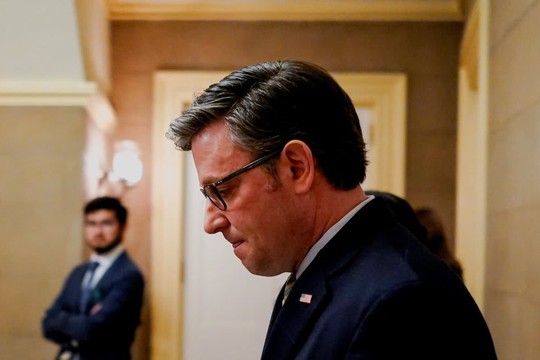Speaker Johnson is unsure of his future, putting Trump's inauguration in question.
Photo: Reuters
The MAGA-verse could be on the brink of exploding into an all-encompassing constitutional crisis, with Donald Trump’s inauguration as possible collateral damage.
The incoming Congress is scheduled to start on Jan. 3, but following a bruising pre-Christmas battle to keep the government open, a few Republican lawmakers — and even President-elect Trump — have hinted they may have turned on House Speaker Mike Johnson (R-LA), writes ‘The Daily Beast’.
Without a speaker, the House of Representatives could become paralyzed, and unable to certify Trump’s re-election victory, plunging the Capitol and the country into political chaos.
After that, nobody knows what would happen. So, how could things play out?
According to the U.S. Constitution, each new session of Congress begins at noon on Jan. 3. In the House of Representatives, the first order of business is for incoming members to choose a speaker, who then swears in the newly elected representatives.
For about 100 years, this step was just a formality, but experts have worried for months that Republicans are so divided they might not choose a speaker in time to count and certify the presidential election results, which by law must happen on Jan. 6 during a joint session of the House and Senate.
Lawmakers don’t need to finish the certification on that same day, but the process has to wrap up by noon on Jan. 20, when the Constitution says the outgoing president’s term ends.
The problem is that the incoming House speaker must receive an overall majority of all the votes cast — not just a majority of the leading party’s votes. The incoming House will have 434 members — usually, 435 — but Rep. Matt Gaetz dropped out following allegations of sexual misconduct and his failed nomination to be Attorney General, meaning Johnson needs 218 votes to hold onto his position.
But Republicans hold such a slim majority — 219 seats to the Democrats’ 215 — that even a few defections would cost Johnson the speakership.
Rep. Thomas Massie (R-KY) has already said he won’t vote for Johnson, and several other Republicans remain undecided, Axios reported earlier this week. And Trump’s' silence on the matter has been defeaning.
Settling on a new speaker could take weeks, and the Jan. 20 deadline is dangerously close. Political science professor Steve Smith of Arizona State University told Roll Call that nobody has any idea what will happen if the House doesn’t elect a speaker by then, because it has never happened.
“The country would be going into one big gray area,” Smith said.
Some constitutional law scholars said the joint session could proceed even without a speaker. Others thought the House clerk could potentially swear in the newly elected members of the House — if both parties agree — or Republicans could elect a temporary speaker whose term expires on a particular day.
If those efforts fail, there would be no one to certify Trump’s election victory in time for the inauguration.
Republican lawmakers rejected the idea of an acting speaker when Johnson was chosen in October 2023, but a raging Trump — whose inauguration would be at stake — might be enough to install one this time.
It’s not clear who that would be, though, after last week’s government shutdown debacle drove an Elon Musk-sized wedge between Trump and Johnson. With government funding set to expire at midnight on Dec. 19, Congress was about to pass a bipartisan continuing resolution bill to keep the government open through March — until the world’s richest man began trashing the agreement on his social media platform X.
Eventually, Trump demanded Johnson replace the bill with a slimmed-down version that also suspended the debt ceiling — a move he wanted to pin on outgoing President Joe Biden. After that one went down in flames, with 38 Republicans joining Democrats to oppose it, a second bipartisan deal avoided a shutdown at the last minute.
Johnson told reporters he thought Trump was probably happy with the outcome, but the president-elect was livid his debt ceiling demands weren’t met, Politico reported.
If the election isn’t certified by Jan. 20, the Constitution is clear that Biden’s term has ended, taking him and Vice President Kamala Harris out of the line of presidential succession. The speaker of the House would be next in theory, but since that position would be empty too, it would pass to the Senate president pro tempore, the majority party’s most senior senator.
read more in our Telegram-channel https://t.me/The_International_Affairs

 11:18 03.01.2025 •
11:18 03.01.2025 •























